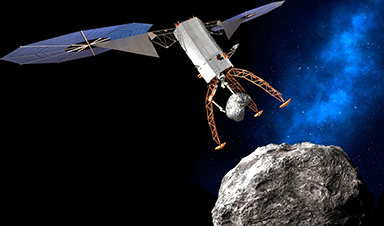In 2015 Congress passed a law to legalise mining in outer space—the first of its kind in the world.
Firms that some day manage to mine asteroids for resources like water or precious metals would henceforth be allowed to own, process, and sell anything harvested. The nascent space-mining industry was thrilled. The boss of a firm called Planetary Resources compared it to the Homestead Act of 1862—a law that gave up to 160 acres in the American West to any plucky settler willing to venture forth.
More recently Wilbur Ross, the commerce secretary, has talked about creating a more “permissive” regulatory environment in space and turning the moon into a “gas station” for further exploration. Other countries are following suit: Luxembourg passed a similar measure last year and earmarked €200m to invest in space-mining companies.
But not everyone is pleased. At the UN committee dealing with outer space, Russia condemned the American move, citing America’s “total disrespect” for international law. Critics say America is conferring rights that it has no authority to confer. There are indeed legal grey areas.
Who owns what in outer space?
Image Credit: © SPL
News This Week
New Toothpaste Stops Gum Disease Without Harming Healthy Bacteria
Researchers have developed a targeted approach to combat periodontitis without disrupting the natural balance of the oral microbiome. The innovation could reshape how gum disease is treated while preserving beneficial bacteria. The human mouth [...]
Plastic Without End: Are We Polluting the Planet for Eternity?
The Kunming Montreal Global Biodiversity Framework calls for the elimination of plastic pollution by 2030. If that goal has been clearly set, why have meaningful measures that create real change still not been implemented? [...]
Scientists Rewire Natural Killer Cells To Attack Cancer Faster and Harder
Researchers tested new CAR designs in NK-92 cells and found the modified cells killed tumor cells more effectively, showing stronger anti-cancer activity. Researchers at the Ribeirão Preto Blood Center and the Center for Cell-Based [...]
New “Cellular” Target Could Transform How We Treat Alzheimer’s Disease
A new study from researchers highlights an unexpected player in Alzheimer’s disease: aging astrocytes. Senescent astrocytes have been identified as a major contributor to Alzheimer’s progression. The cells lose protective functions and fuel inflammation, particularly in [...]
Treating a Common Dental Infection… Effects That Extend Far Beyond the Mouth
Successful root canal treatment may help lower inflammation associated with heart disease and improve blood sugar and cholesterol levels. Treating an infected tooth with a successful root canal procedure may do more than relieve [...]
Microplastics found in prostate tumors in small study
In a new study, researchers found microplastics deep inside prostate cancer tumors, raising more questions about the role the ubiquitous pollutants play in public health. The findings — which come from a small study of 10 [...]
All blue-eyed people have this one thing in common
All Blue-Eyed People Have This One Thing In Common Blue Eyes Aren’t Random—Research Traces Them Back to One Prehistoric Human It sounds like a myth at first — something you’d hear in a folklore [...]
Scientists reveal how exercise protects the brain from Alzheimer’s
Researchers at UC San Francisco have identified a biological process that may explain why exercise sharpens thinking and memory. Their findings suggest that physical activity strengthens the brain's built in defense system, helping protect [...]














Leave A Comment